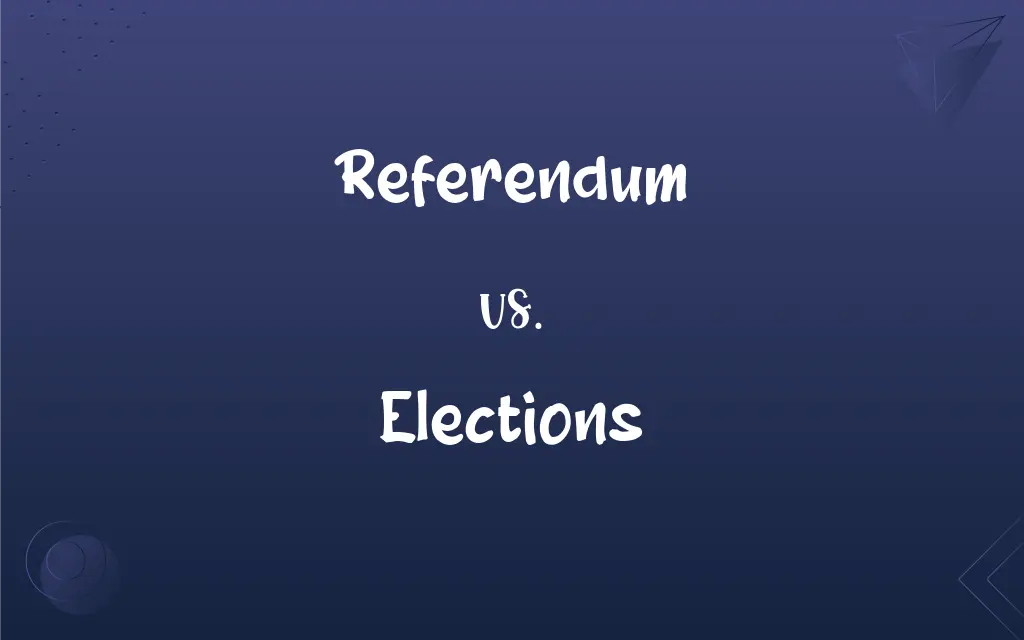Referendum vs. Elections: What's the Difference?
Edited by Aimie Carlson || By Harlon Moss || Updated on October 18, 2023
A referendum is a direct vote on a specific issue; elections are votes to choose representatives or leaders.

Key Differences
A referendum is a tool of direct democracy, allowing citizens to vote directly on specific questions or issues. Typically, a government or legislative body poses a question, and the public provides a "yes" or "no" answer. Elections, on the other hand, are the cornerstone of representative democracy, where citizens select individuals to represent their interests in legislative bodies or hold public office.
While referendums give people the power to decide on particular matters or policies directly, elections entrust chosen representatives with the authority to make decisions on the public's behalf.
In some cases, referendums arise because elected representatives, from elections, find specific issues too contentious or believe the public should have a direct say. On the other hand, elections are regular events in democracies, allowing for the rotation of power and the renewal of mandates.
The outcome of a referendum typically has a direct and immediate impact on the question at hand. In contrast, the results of elections determine which individuals or parties will have influence over a broad range of issues over an extended period.
While referendums and elections are both mechanisms to gauge public opinion and make decisions, their scopes, and implications are distinctly different. One focuses on particular issues, and the other emphasizes choosing leaders or representatives.
ADVERTISEMENT
Comparison Chart
Definition
Direct vote on a specific issue.
Vote to choose representatives or leaders.
Tool Of
Direct democracy.
Representative democracy.
Frequency
Occasional, based on issues.
Regular, based on terms.
Focus
Specific issues or questions.
Individuals or parties.
Outcome Impact
Direct impact on the specific issue.
Influence over various issues over a term.
ADVERTISEMENT
Referendum and Elections Definitions
Referendum
A referendum is a process where citizens vote on specific legislative proposals.
The referendum on tax reforms was narrowly defeated.
Elections
Elections are processes where citizens vote to select leaders or representatives.
Presidential elections are held every four years.
Referendum
A referendum is a method of direct decision-making by an entire population.
The government proposed a new law and put it to a referendum.
Elections
Elections are a mechanism to choose individuals for public offices.
Local elections determine the city's mayor and council members.
Referendum
A referendum is a direct vote where people decide on a single political question.
The country held a referendum on its EU membership.
Elections
Elections are events in democracies to maintain rotation of power.
The upcoming elections could change the balance of power in Congress.
Referendum
A referendum determines public opinion on a particular issue.
The outcome of the referendum showed strong support for the initiative.
Elections
Elections allow citizens to voice preferences for parties or candidates.
During the elections, voter turnout was remarkably high.
Referendum
A referendum is a public consultation on matters of national or regional importance.
The city's residents voted in a referendum about the new park.
Elections
Elections are contests to fill public roles in governance.
She announced her candidacy for the upcoming elections.
Referendum
The submission of a proposed public measure or actual statute to a direct popular vote.
Elections
The act or process of electing someone to fill an office or position
Officers are chosen by election and not by appointment.
Referendum
Such a vote.
Elections
An instance of this
Did you vote in this election?.
FAQs
Can referendums overturn laws?
Yes, depending on the jurisdiction and the issue.
Why are referendums used?
To directly gauge public opinion on specific issues.
How often are elections held?
Typically at regular intervals, depending on the office and country.
Do all countries have elections?
Most, but not all. Some countries have limited or no democratic processes.
What's the difference between general and local elections?
General elections decide national roles; local elections decide local roles.
What is an advisory referendum?
A referendum whose result is not legally binding but provides guidance.
How are election winners determined?
By the electoral system in place, e.g., first-past-the-post or proportional representation.
What issues are suitable for a referendum?
Issues of significant public interest or constitutional importance.
What is a referendum?
A direct vote on a specific issue or question.
Are referendum results binding?
It varies; some are advisory, while others are legally binding.
Can a referendum result be ignored?
Technically yes, especially if advisory, but it may have political implications.
Who can participate in elections?
Typically, eligible citizens, but criteria vary by country.
Why are elections important?
They ensure democratic representation and accountability.
What is a by-election?
An election held between general elections, usually due to a vacancy.
What's a plebiscite compared to a referendum?
Both are direct votes, but plebiscites often address sovereignty or territory.
Can foreigners vote in elections?
Typically no, but some countries allow resident foreigners to vote in local elections.
What are elections?
Votes to choose representatives, leaders, or public officials.
How are referendum questions chosen?
Usually by governments or legislative bodies.
How are election dates decided?
By laws, constitutions, or decrees, depending on the jurisdiction.
Can a referendum decision be reversed?
Yes, through another referendum or legislative action.
About Author
Written by
Harlon MossHarlon is a seasoned quality moderator and accomplished content writer for Difference Wiki. An alumnus of the prestigious University of California, he earned his degree in Computer Science. Leveraging his academic background, Harlon brings a meticulous and informed perspective to his work, ensuring content accuracy and excellence.
Edited by
Aimie CarlsonAimie Carlson, holding a master's degree in English literature, is a fervent English language enthusiast. She lends her writing talents to Difference Wiki, a prominent website that specializes in comparisons, offering readers insightful analyses that both captivate and inform.































































